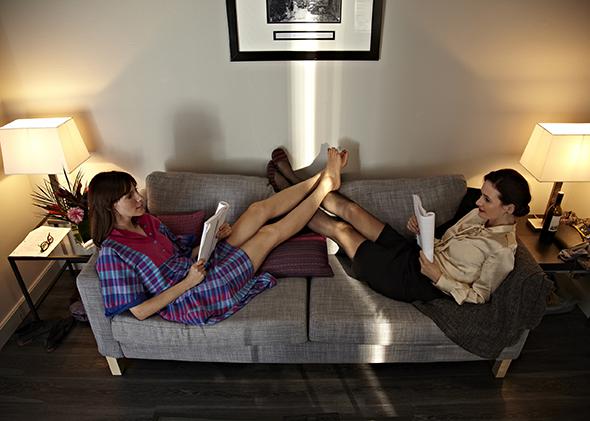Doll & Em, a six-episode series premiering on HBO Wednesday night, stars Emily Mortimer and Dolly Wells, real-life best friends, as dysfunctional versions of themselves. The to-the-point opening credits set the scene: Doll, a waitress in London, breaks ups with her boyfriend and tearfully calls her bestie, Em, who takes the call even though she happens to be on the red carpet with Bradley Cooper. In short order, Doll has flown to L.A. to be Em’s assistant, a well-meaning arrangement—Doll gets out of London and gets paid; Em gets to have Doll around—with such insidious power dynamics it rapidly goes all wrong.
I liked Doll & Em quite a bit, in no small part because it is a very reliable deliverer of certain genre pleasures. The genre I am talking about is not the cop, lawyer, or doctor variety, but the most popular genre of this moment, a type of show that is everywhere even though it does not yet have a name as succinct as “cop show.” Featuring a series of challenging protagonists, these shows fit a genre so expansive—starting with The Sopranos and the British Office, it includes everything from House to Breaking Bad to House of Cards, Curb Your Enthusiasm to Enlightened, Girls to The Mindy Project—it feels, right now, like it’s not really a genre at all, but the very TV air we breathe. But creating a main character who is so flawed that we, in the audience, are supposed to notice and register and feel something about those flaws is as much a choice as setting your show in police station or a lawyer’s office.
Let’s call them “jerk shows”—not just for the personality trait of their main characters but for how these series work on us, jerking us the hell around. After all, at this point, these shows have recognizable genre-specific beats: The protagonist does something awful, then does something moderately less awful, and we, at home, watch it all through our fingers, seesawing between horror and admiration, love and hate, our thrills provided not by a car chase or a cleverly solved mystery but by our turbulent emotional connection to the jerk in question.
Doll & Em fits into the genre of jerk TV perfectly. The show, which is loosely improvised, very deftly and quickly establishes all the ways that Doll and Em’s new employment arrangement is going to wreak havoc on their long-standing friendship. Lying on the couch in Em’s house, Doll asks her what kind of coffee she likes, because assistants get coffee. Em insists that Doll doesn’t need to get her coffee, waits a second and then says, “I can tell you what kind of coffee I like, if it comes up at some point in the day.” Em, it turns out, likes a really frothy latte with three shots in a medium-size cup, an order she describes as “really easy,” which is the truly alarming thing about it: Em is high-maintenance, but she’s pretending to be no maintenance at all.
In almost no time, Doll is extremely resentful of Em’s needs and Em is extremely resentful of what a crap assistant Doll is. But the problem is not simply that an entitled movie star expects to get what she’s paying for, even though she said she wasn’t expecting that at all. (Doll wonders if she has to do Em’s laundry. Em laughs: “That would be so creepy. I have a cleaning lady who does that.”) Doll is not Em’s subordinate, and having to behave like one makes her insensitive to Em’s problems, which she basically doesn’t believe exist. She is completely dismissive of any stress that Emily might be under, sure that her own drama with her ex-boyfriend is much, much harder than top-lining a film.
Doll & Em, a show made by two actresses, is more sensitive to the anxiety and pressure of acting, on demand on a movie set, than anything I can remember seeing. “I try not to be precious about my job,” Em says, “but you’re embarrassed most of the time, and terrified the rest of it.” It is also particularly attuned to the lack of good female roles, but not exactly in the way I expected. Em is starring in a movie called Valerie Leigh; Chloë Sevigny cautions Em, “It’s so rare to find a part like this, a smart complex female character. Treasure it.”
But Valerie Leigh seems like a pretty bad movie. It is described again and again as The Godfather with a woman, which someone finally points out sounds awful. The scenes we see from it are stiff and uptight; the props and makeup are always wrong; the young director is a pompous pissant. All shoot long, people keep unhelpfully telling Em she really needs to bring it, to be strong, to rise to the occasion, but at the climatic moment of Doll & Em—when the big fight between the two friends finally arrives—Em yells, “If one more person calls me a strong woman, I am going to scream. I am vulnerable!”
Emily Mortimer and Dolly Wells are probably just as sick as Em is of the straitjacket that says a “good” role for women has to involve being a role model of “strong” female behavior. And so they went out and made themselves a show in which they both have the freedom to behave like jerks. Watch it through your fingers.
